Washington, September 7 (RHC)-- A trial against U.S. Senator Robert Menendez, a main promoter of sanctions against Venezuela and Cuba, has begun on charges of bribery and fraud for allegedly receiving millions in exchange for political favors.
The New Jersey politician is accused of advocating for his friend and campaign donor Salomon Melgen, in exchange for millions in funds, luxury vacations, private plane trips and other gifts, according to Telemundo. In return for these, according to the prosecution, the Florida eye doctor received help in a dispute with health officials on payments related to health services.
Menendez is also accused of urging the authorities of the Dominican Republic to accept a contract with a security company owned by Melgen. Both face 12 counts on these crimes.
Menendez has said he is innocent in this case, although this is the second time he faces charges, as he was indicted in 2015 on similar corruption charges.
Melgen was convicted of Medicare fraud amounting to over $100 million in April and is facing up to 30 years in prison.
Menendez, of Cuban descent, is the top Democrat on the influential U.S. Senate Foreign Relations Committee. He opposed the moves toward normalizing relations with Cuba and asked that the island remain on the U.S. list of states that sponsor terrorism.
Menendez was one of the lawmakers that demanded U.S. President Donald Trump impose sanctions on Venezuela, and suggested petitioning the Organization of American States to invoke the Inter-American Democratic Charter, to possibly force a regime change in the country. He also called for an investigation into the Bolivarian government’s alleged ties to terrorism and advocated for large financial support for right-wing opposition groups in Venezuela.
The U.S. Justice Department initiated an investigation in 2015 into Menendez for his support of two fugitive banker brothers from Ecuador who were largely responsible for the country’s financial crisis in 1999. The New York Times revealed in an investigation that the political donations made by the Isaias family bought them protection in the United States. The report details the donations of hundreds of thousands of dollars to political campaigns, which were often followed by favorable decisions by the U.S. government.
Roberto and William Isaias were found guilty and sentenced to eight years in prison. The Isaias brothers have been living in the United States, fugitives from Ecuadorean justice. Their bank, Filanbanco, now extinct, received millions from the Ecuadorean state in bail-outs during the country’s bank crisis. The government of Ecuador has requested their extradition but the U.S. government has denied the request for the past 13 years.
In a related case, Menendez lobbied to lift a ban against Estefania Isaias, daughter of Roberto Isaias, from entering the United States. She was charged with fraudulent actions to obtain visas for her domestic employees, but after Menendez’s help, high-ranking officials in the U.S. State Department lifted the ban.
U.S. Senator Robert Menendez Faces Corruption Charges


